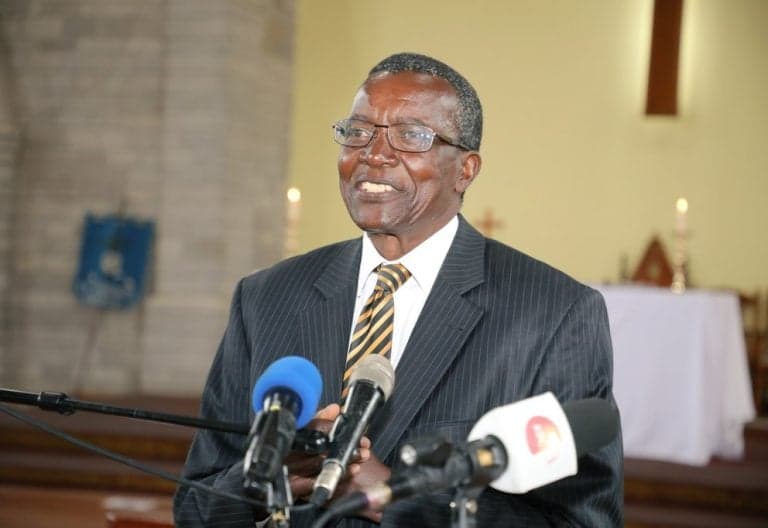We're loading the full news article for you. This includes the article content, images, author information, and related articles.
Former Chief Justice David Maraga enters the presidential race, citing the 2024 youth-led demonstrations as a pivotal moment. His campaign, focused on constitutionalism, now faces the challenge of converting street-level support into a viable national political force against established figures.

Former Chief Justice David Maraga has formally declared his candidacy for Kenya's 2027 presidential election, stating his decision was directly inspired by the nationwide Gen Z-led protests of 2024 and the government's subsequent handling of the youth. Positioning himself as a champion of constitutional order, Maraga's entry introduces a new dynamic into a political landscape still reeling from the impact of the youth movement.
"To see our young people being handled the way they have been handled is something that is extremely worrying," Maraga stated in a televised interview on Wednesday, June 19, 2025, confirming his intention to run. He explained that after extensive consultations and reflection on the country's governance, he felt compelled to act. "We can't let some people literally throw our country to the dogs... I have made up my mind that I will run for the presidency in 2027," he affirmed.
Maraga, who retired from the judiciary in January 2021, has since become an increasingly vocal critic of the current administration, particularly on issues of police brutality and adherence to the rule of law. His transition from jurist to political contender gained momentum through his active support for the protest movement. He attended an inter-denominational service for victims of the protests in June 2025 and was seen on the streets with demonstrators commemorating the anniversary of the anti-Finance Bill marches.
The 2024 protests, sparked by the contentious Finance Bill, saw a massive, digitally-organized mobilization of young Kenyans demanding economic justice and greater government accountability. The demonstrations, which began peacefully in June 2024, escalated after the bill was passed, leading to violent clashes with security forces, the storming of Parliament, and dozens of fatalities. President William Ruto's government eventually withdrew the bill but faced widespread condemnation for the deadly crackdown.
Maraga has framed these events as a critical turning point for the nation and a clear sign of failed leadership. He has repeatedly called for justice for slain protesters and condemned what he describes as a breakdown of the rule of law. By aligning himself with the Gen Z movement, he aims to capture the energy of a significant and politically awakened demographic. A study by OdipoDev and Tribeless Youth noted a surge in political consciousness among Gen Z, with seven in ten young Kenyans intending to vote in 2027, a potential shift that could disrupt traditional ethnic-based voting patterns.
Running under the slogan "Reset, Restore, Rebuild," Maraga has joined the United Green Movement (UGM) party, which will serve as his political vehicle. His campaign platform is anchored on three core pillars: restoring constitutionalism and the rule of law, fighting systemic corruption, and ending police brutality. "The major problem in this country is corruption. Budgeted and institutional corruption that is not being solved effectively," Maraga stated in March 2025.
This message resonates with his legacy as the Chief Justice who led the Supreme Court in the historic 2017 annulment of a presidential election, a decision that cemented his reputation for judicial independence. Supporters, including former Law Society of Kenya President Nelson Havi, have lauded his bid as a quest for integrity in leadership.
Despite the groundswell of online enthusiasm, political analysts caution that Maraga faces a formidable path to the presidency. His primary challenges include a lack of political machinery and campaign financing. Maraga has pledged to crowdfund his campaign, rejecting reliance on wealthy financiers who, he says, "buy your soul." However, recent reports of a high-profile resignation from his political committee citing a divergence on "foundational values" suggest potential internal challenges.
Furthermore, analysts point to Kenya's deeply entrenched ethnic and regional voting blocs as a major hurdle for a candidate without a strong tribal base. Maraga also faces competition for influence within his own Gusii community from former Interior Cabinet Secretary Fred Matiang'i, who is also expected to contend for the presidency. Some political observers have raised suspicions that Maraga could be a "state project" intended to split the opposition vote, a claim he has firmly denied.
The 2027 presidential field is already becoming crowded, with declared aspirants including activist Boniface Mwangi, Busia Senator Okiya Omtatah, and several opposition figures like Kalonzo Musyoka and Martha Karua, who have vowed to field a single candidate to challenge President Ruto. For Maraga, the ultimate test will be whether the "grandfatherly aura" that has endeared him to many young Kenyans can be transformed into a structured, nationwide campaign capable of winning at the ballot box. Success will depend on his ability to convince the politically energized, yet skeptical, Gen Z to overcome voter apathy and trust in the electoral process—a significant challenge highlighted by recent surveys.
Keep the conversation in one place—threads here stay linked to the story and in the forums.
Sign in to start a discussion
Start a conversation about this story and keep it linked here.
Other hot threads
E-sports and Gaming Community in Kenya
Active 9 months ago
The Role of Technology in Modern Agriculture (AgriTech)
Active 9 months ago
Popular Recreational Activities Across Counties
Active 9 months ago
Investing in Youth Sports Development Programs
Active 9 months ago
Key figures and persons of interest featured in this article